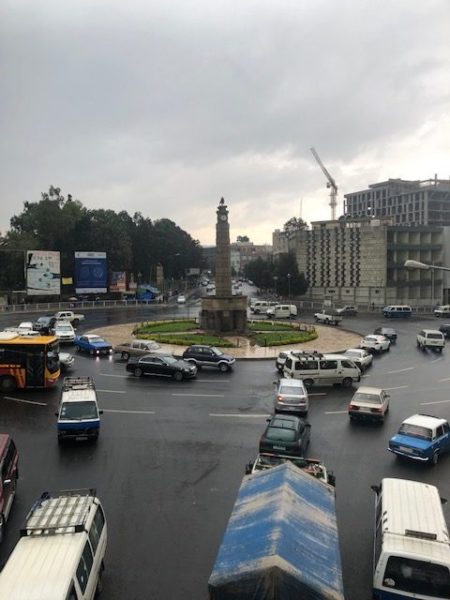Taxi Drivers Know More Than You Think
By Henry Young ’20
CAD Student Researcher
Summer Fellows Cohort 2018
Hello everyone! I arrived in Addis Ababa, Ethiopia’s capital, a little more than a week ago and I now finally have time to sit down and reflect on my time here. I have spent the first stint of my stay familiarizing myself with the city and figuring out what resources will be useful for my research.
Essentially, this translates to spending most of my time reading and searching through archives. The National Archives has become my second home because of the breadth and depth of its historical government statistical collection. When I am not holed up at the archives, you can usually find me at a nice hotel far above my pay grade, grabbing a cup of coffee so I can mooch off their WIFI and do research! Unfortunately, where I am staying does not have WIFI, so I must get creative where I work. I have become a master at managing the delicate balance between ordering enough, so workers do not know I am there for the WIFI, but not enough to break my bank account.

After classes get out at the University, students come to hang out at the soccer field and watch pick-up
I am so excited to be in Ethiopia to conduct research on the political economy surrounding Ethiopian industrial policy. I am also interested to learn how the historical cash-crop economy, which for the better part of the 20th century accounted for almost 70% of Ethiopia’s economy, currently shapes the distribution of economic activity in the country and how it should inform current industrial policy decision-making.
Industrial policy is a set of explicit and implicit policy tools politicians use to promote manufacturing. Many development economists argue that transformative long-run economic growth can only occur when the manufacturing sector is sufficiently large enough. In short, manufacturing is thought to be more productive than other sectors and have larger spill-over effects on the rest of the economy. But, how do developing countries create the necessary conditions to support industrialization? Can the government artificially create competitive, export-oriented manufacturing sectors?
The jury is still out on this question and you will get a wide variety of answers depending with whom you talk. Most Western economists argue that industrial policy is largely ineffective at promoting industrialization because it restricts markets from properly functioning and impedes countries from focusing on their comparative advantage. People from this school of thought often point to the failed import-substitution-industry (ISI) policy measures Latin American countries undertook during the 20th as evidence to support their claim. On the other hand, proponents point to East Asian “Tigers” experience such as South Korea, Japan, Taiwan, and most recently China, as these countries effectively used industrial policy to promote export industries and ultimately create higher value products. There is a lot of evidence to suggest that current international name-brand companies like Samsung, Sony, Hyundai, and Toyota would not be around today were it not for East Asian countries’ government support.
Ethiopia has elected to side with the East Asian “development state” strategy, where the government plays an active role in supporting industrial development by picking sectoral “winners”, or certain industries to support. I am interested to learn more about whether the East Asia “Tiger” policy agenda can be successfully applied to the African continent, in a drastically different cultural and historical context. To understand how this policy process affects local Ethiopian businesses, it is helpful to talk to those who experience it and are affected by the government’s mandates.
Surprisingly, I have learned more about the current obstacles Ethiopian businesses face by talking to taxi-cab drivers than I have talking to researchers. I am often in transit, traveling from place-to-place in Addis, so I have had many opportunities to strike up conversations with local drivers.

This is Victory Monument; traffic circles are very common here and quite hectic to say the least! The monument marks the beginning of Arat Kilo.
One of my drivers shared that the lack of foreign currency has driven up IT hardware prices, which are all imported, making it harder to service contracts at a competitive price. He attests that if the country’s export earnings increased over the long run, creating a steady supply of foreign currency reserves, he could devote more time to his business since he would be able to serve more contracts. Although the IT business appears to be booming on the demand side, costly imported inputs prohibit IT firms from supplying this growing market.
Business owners in Ethiopia face steep roadblocks that we simply cannot relate to. American consumers get frustrated when their Amazon package arrives a day late; now imagine your business depends on receiving an Amazon package and it arrives a week late, and when it does arrive, it is not what you ordered. It is important to recognize how systemic and interrelated these problems are; there clearly is no silver bullet and evidence suggests that it will take years of policy learning and adaptation for the government to successfully serve emerging manufacturing sectors. Since Ethiopia has placed a massive bet on kick-starting their manufacturing sector in the hopes it can lead to long-run growth by taking out massive loans, the elephant in the room is how long can Ethiopia wait?
Want to know the answer? Read Henry’s full blog.
About the Author:
 Meet Henry Young ’20, student researcher with the Center for African Development of W&M’s Global Research Institute. He is a 1693 Scholar studying Economics. Last year Henry traveled to Liberia as a 2018 Summer Fellow in collaboration with Professor Phil Roessler and the Monrovia Football Academy. This summer, he will build on this previous experience by laying the research foundation for an impact evaluation for the academy in Morocco, modeled on an impact evaluation conducted in Liberia.
Meet Henry Young ’20, student researcher with the Center for African Development of W&M’s Global Research Institute. He is a 1693 Scholar studying Economics. Last year Henry traveled to Liberia as a 2018 Summer Fellow in collaboration with Professor Phil Roessler and the Monrovia Football Academy. This summer, he will build on this previous experience by laying the research foundation for an impact evaluation for the academy in Morocco, modeled on an impact evaluation conducted in Liberia.




No comments.
Comments are currently closed. Comments are closed on all posts older than one year, and for those in our archive.